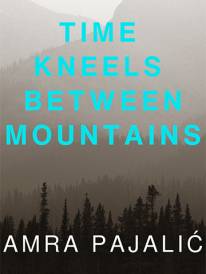Bradley Cooper Limitless

Limitless
Cast: Bradley Cooper, Robert De Niro, Abbie Cornish, Anna FrielDirector: Neil Burger
Genre: Drama, Thriller
Rated: M
Running Time: 105 minutes
Synopsis: Bradley Cooper and Robert De Niro star in Limitless, a paranoia-fueled action thriller about an unsuccessful writer whose life is transformed by a top-secret "smart drug" that allows him to use 100% of his brain and become a perfect version of himself. His enhanced abilities soon attract shadowy forces that threaten his new life in this suspenseful and provocative film. Aspiring author Eddie Morra (Cooper) is suffering from chronic writer's block, but his life changes instantly when an old friend introduces him to NZT, a revolutionary new pharmaceutical that allows him to tap his full potential. With every synapse crackling, Eddie can recall everything he has ever read, seen or heard, learn any language in a day, comprehend complex equations and beguile anyone he meets-as long as he keeps taking the untested drug.
Soon Eddie takes Wall Street by storm, parlaying a small stake into millions. His accomplishments catch the eye of mega-mogul Carl Van Loon (De Niro), who invites him to help broker the largest merger in corporate history. But they also bring Eddie to the attention of people willing to do anything to get their hands on his stash of NZT. With his life in jeopardy and the drug's brutal side effects taking their toll, Eddie dodges mysterious stalkers, a vicious gangster and an intense police investigation as he attempts to hang on to his dwindling supply long enough to outwit his enemies.
In Cinemas: March 17th, 2011
Website: www.limitlessmovie.com.au
About the Production
Screenwriter Leslie Dixon was browsing through the shelves of a secondhand bookstore when she first came across the novel, The Dark Fields. A riveting, high-concept thriller written by Alan Glynn, the book had a premise that immediately intrigued her. What if there was a drug that would make you the best you could possibly be? A drug that allowed you to use every scrap of potential you possess? Would you take it?
"I bought the book and started reading it," says Leslie Dixon. "About halfway through, I got a sizzle of excitement that it could be a Hollywood film. I eventually optioned it with my own money and wrote the script on my own to see if I could get it made without a lot of compromises. And here we are."
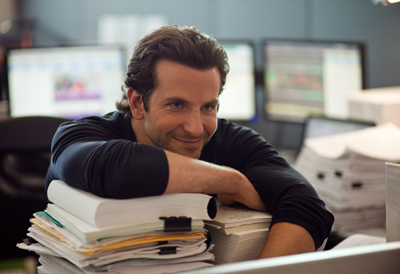 The story's provocative idea seemed like the perfect panacea for the Information Age, where an endless stream of data speeds past us all at an overwhelming pace. "The premise may seem to verge on science fiction, but that kind of technology is probably not far off," says Leslie Dixon, whose diverse writing credits include such blockbusters as Mrs. Doubtfire, Hairspray and Freaky Friday. "I'm sure there are researchers in labs right now trying to make 'smart drugs' to improve memory, cognitive function and reflexes."
The story's provocative idea seemed like the perfect panacea for the Information Age, where an endless stream of data speeds past us all at an overwhelming pace. "The premise may seem to verge on science fiction, but that kind of technology is probably not far off," says Leslie Dixon, whose diverse writing credits include such blockbusters as Mrs. Doubtfire, Hairspray and Freaky Friday. "I'm sure there are researchers in labs right now trying to make 'smart drugs' to improve memory, cognitive function and reflexes." Eddie Morra, played by Bradley Cooper, is a writer slowly descending into oblivion. As the story begins, his girlfriend dumps him, his publisher threatens to drop him unless he can produce the manuscript he has promised and his landlady wants to evict him. But when an old friend slips him a tablet of the mysterious drug NZT, Eddie is transformed into an unstoppable torrent of ideas and accomplishments, bringing him the success he has always dreamed of.
"I think most people, myself included, would take that pill if it was offered," Leslie Dixon says. "I think it reverberates with what's really going on right now in our society. People are taking things like Adderall to give themselves an edge. It's sort of ironic that we have begun to see drugs as a way to enhance our achievement rather than just to have fun."
Watching Eddie's journey from obscurity to wealth and fame is an entertaining ride, she says. "And the things that he is able to do on that ride are things that we all aspire to," Leslie Dixon continues. "He can effortlessly learn foreign languages. He learns to read music in a day. Women drop at his feet after half a dozen sentences, because he's so charming and funny. All of these things are things that we wish we could do, and it's fun to go there with the character. When things get hairy and it turns out that bad people are after him, watching him think and fight his way out of those situations is exhilarating."
Leslie Dixon gave the finished script to Scott Kroopf, a producer she has known since they worked together on her first film, Outrageous Fortune. "It was such a strong concept, beautifully executed and filled with Leslie Dixon's great sense of humor," says Scott Kroopf. "She told me the amazing story of how she found it and did the original draft of the script for nothing. I immediately fell in love with it."
The idea of a smart drug captured his imagination. "I have not yet met a person who isn't intrigued by the idea of being able to use 100% of their brain," the producer says. "You could see and perceive more. You might be more coordinated. You could learn faster and recover memories you thought you had forgotten long ago. Suddenly, it's all accessible.
"Obviously, there is a price," he adds. "Anything that is like a steroid for your mind is an intrinsically dangerous idea."
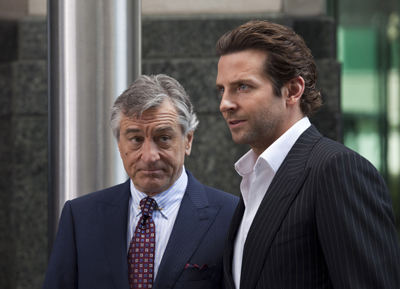 Once Leslie Dixon and Scott Kroopf agreed to produce the film together, they set about finding a director. Neil Burger, whose earlier films include The Illusionist and Interview with the Assassin, impressed them with his innovative concept for the movie. "I wanted the story to be completely believable, to play it absolutely real," Neil Burger says. "Yet I also wanted to get into Eddie's head, to show how he perceived the world when he was on the drug, how he processed information and what it was really like to be so smart. I had a number of ideas for unconventional visual techniques to show how he perceives the world."
Once Leslie Dixon and Scott Kroopf agreed to produce the film together, they set about finding a director. Neil Burger, whose earlier films include The Illusionist and Interview with the Assassin, impressed them with his innovative concept for the movie. "I wanted the story to be completely believable, to play it absolutely real," Neil Burger says. "Yet I also wanted to get into Eddie's head, to show how he perceived the world when he was on the drug, how he processed information and what it was really like to be so smart. I had a number of ideas for unconventional visual techniques to show how he perceives the world." And perception is exactly what Limitless is about, according to Scott Kroopf. "We had to find someone who is visually oriented for the movie to hit its full potential," the producer says. "Neil Burger was determined to find original ways to tell the story, so he embraced ideas that were visually more bold and daring than what many people do."
Neil Burger saw the story as both a thriller and a picaresque journey for Eddie. "He goes from an Everyman who's failing to a guy who is on top of the world," the director says. "When I first read the script, I envisioned a freewheeling, fever dream of a movie with a really wild energy to it. That's the way the character travels through the city on this drug. He's cartwheeling through life."
Eddie becomes accomplished and successful beyond his wildest dreams, but there is a downside, Neil Burger observes. "The drug has horrible side effects. He has to stay on it or he gets piercing headaches. And when he takes too much of it, he loses blocks of time.
"The movie is about human potential, but it's also about power and the powerful ride Eddie goes on," the director continues. "The movie is very much about today, and it's very much about New York. But it's more universal than that. It's about a guy who has a thirst for success that he's never been able to satisfy. The question is what is he willing to do to get what he's after? I want the audience to be there with him as he makes his choices. He's such a winning character that you're willing go down the dark turns with him, as well as into the light."
At the heart of the film is one key question, says Neil Burger: "What if there was a pill that would make you rich and powerful? Would you take it? I think we'd all love to do something special and make an impact on the world. This story is about a guy who actually finds a fantastical way to make that happen, and it's all played very real. It's not magic. He's not a superhero; he's the perfect version of himself.
"There are drugs like this already," Neil Burger continues. "Provigil and Adderall and others. NZT is like that times a thousand. It's completely turbocharged. But if it's all just tinkering with brain chemistry like a computer hard drive, where does personal responsibility come in? What are the limits of our moral identity?"
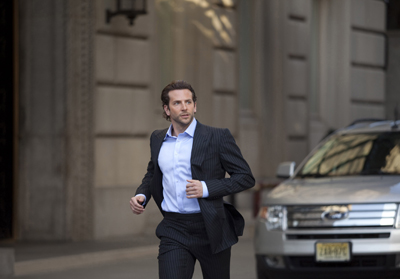 The completed film combines suspense, action and humor with stylish visuals for an unforgettable thrill ride. "It's a great story with some really fantastic acting along with several surprising plot twists that give it excitement and thrills," says Scott Kroopf. "Think of it as the NZT ride. Bradley Cooper is in the seat right next to you and you're going through it with him. The movie plays out in such a way that the audience enjoys the fun of the ride, but they also get to walk out and say, 'Hey, if I was in Eddie's shoes, what would I have done?' It should be fun, but it probably will scare the hell out of you as well."
The completed film combines suspense, action and humor with stylish visuals for an unforgettable thrill ride. "It's a great story with some really fantastic acting along with several surprising plot twists that give it excitement and thrills," says Scott Kroopf. "Think of it as the NZT ride. Bradley Cooper is in the seat right next to you and you're going through it with him. The movie plays out in such a way that the audience enjoys the fun of the ride, but they also get to walk out and say, 'Hey, if I was in Eddie's shoes, what would I have done?' It should be fun, but it probably will scare the hell out of you as well." About the Casting
The role of Eddie Morra is a demanding one, requiring an actor who can hold the screen while appearing in every scene of the film, and make a believable transformation from apathetic slacker into magnetic alpha dog. "We all had our eye on Bradley Cooper," says Neil Burger. "He's an excellent actor, but studios always ask filmmakers, 'Can we finance the movie on his name?'
Luckily The Hangover came out while we were casting and suddenly he was a real possibility. I met him in New York and we hung out for an evening, talking about the movie, about life, about everything. He has such a winning personality and I could see how it would translate to our story."
Bradley Cooper's innate intelligence made him top choice for the role. "Eddie needs to be incredibly articulate," says Neil Burger. "He has to be able to run circles around other people verbally. I knew that Bradley Cooper was a very smart guy and a great talker."
On the other hand, he has to be believable as the character the audience meets at the beginning of the story: a complete failure. "Bradley Cooper and I discussed our own stories of struggling to make it," the director says. "We'd both been out of work, living in crummy apartments and on the verge of giving it all up. He had great insights into all of it. I was certain he could play all the facets of Eddie believably and powerfully."
"It's a tour de force part," adds Scott Kroopf. "We needed someone charming, funny, smart and charismatic. Bradley Cooper was a rising star and he also just happened to be perfect for the movie. He's exactly the right age. He can play both the down-on-his-luck, sad-sack writer and the articulate, brilliant guy who's using a 100 percent of his brain. Bradley Cooper has an opportunity here to use all his comedy chops, and then gets to show off all the other qualities he has as an actor."
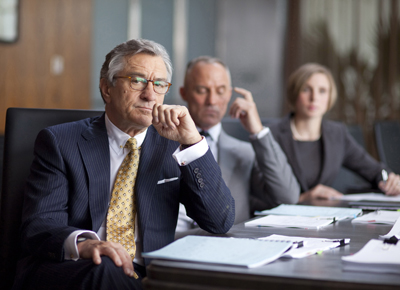 In Bradley Cooper, the filmmakers also found an actor who naturally pulls audiences into his world. "The genius of having Bradley Cooper play Eddie is that everyone wants to be his friend," says Scott Kroopf. "Guys like him and girls really like him. He's the kind of guy that you want to go out and have a beer with or go on some crazy adventure with."
In Bradley Cooper, the filmmakers also found an actor who naturally pulls audiences into his world. "The genius of having Bradley Cooper play Eddie is that everyone wants to be his friend," says Scott Kroopf. "Guys like him and girls really like him. He's the kind of guy that you want to go out and have a beer with or go on some crazy adventure with." The actor brought his talent, enthusiasm and energy to a role that required complete commitment. "This script was by far one of the best I'd ever read," says Bradley Cooper. "I have never talked to anybody who read it and didn't think that it was incredible from start to finish."
Director Neil Burger's concept for the film was an additional lure for the actor. "Neil Burger was clear from the beginning that he wants the viewer to go along for the ride with Eddie," Bradley Cooper says.
"When he shared his ideas with me, I got very excited. He's effortless to work with, because there's absolutely no ego, yet he knows exactly what he wants to do."
Whether Eddie is on or off NZT, Cooper's connection to the character is unwavering. "To take this character from the beginning of the movie to the end is an actor's dream," he says. "When we meet him, he's down and out. Living the way he does might have been cool when he was 25, but at 35, it becomes pathetic.
"When Eddie takes the NZT, his problems are solved," continues the actor. "He writes his manuscript very fast. Then it's a question of what else is he going to do with his enhanced abilities. What would you do if you became the best version of yourself? First of all, who would that be? And then what price would you have to pay in order to achieve it? It's quite a question."
Bradley Cooper won the admiration of his co-workers on the film with his unflagging energy. "Bradley Cooper was the hardest working person on this movie," says Neil Burger. "He's in virtually every frame. His character goes through such enormous changes. He's a failure, he's a success, he's dying. All sorts of things happen to him. We've seen the different facets of what Bradley Cooper can do as an actor before, but this is all of his skills and talents jammed into this one movie. And his performance is incredible."
"I hope audiences watching this movie will live vicariously through Eddie," says Bradley Cooper.
"I want them to experience the high with him and then deal with the reality of what happens down the road. It's a roller coaster ride from the beginning to the end."
Eddie's spectacular rise in the financial world attracts the attention of billionaire Carl Van Loon, played by Oscar winner Robert De Niro. "Van Loon is one of the smartest guys in the financial game," says Neil Burger. "Robert De Niro is fantastic in the role, because he is an incredibly intelligent, powerful guy. He is also a very generous and kind person as well, and, at first, Van Loon comes off that way. He seems to be taking Eddie under his wing. But, as in Robert De Niro's best roles, there's something just a little sinister under the surface."
 Neil Burger had met with Robert De Niro shortly after The Illusionist was released and both men expressed an interest in working together. "At first the part of Van Loon didn't seem important enough for him," the director says. "But then we all thought, let's at least take the shot. I spoke to him about it and he said he liked the part but didn't feel like there was enough for him to do. I discussed some ideas about changing the part for him, he liked them and left the door open to go back to him. I told Leslie Dixon and she wrote some great new lines for him."
Neil Burger had met with Robert De Niro shortly after The Illusionist was released and both men expressed an interest in working together. "At first the part of Van Loon didn't seem important enough for him," the director says. "But then we all thought, let's at least take the shot. I spoke to him about it and he said he liked the part but didn't feel like there was enough for him to do. I discussed some ideas about changing the part for him, he liked them and left the door open to go back to him. I told Leslie Dixon and she wrote some great new lines for him." When Leslie Dixon learned that Robert De Niro was available to play the role, she jumped back into the script to develop the character into a part she thought would be worthy of the acclaimed actor's talent. "At first, Van Loon was more of a straight supporting character," says Leslie Dixon. "And then we all got really excited about the idea of Robert De Niro playing the role. But I realised to my horror that I'd written kind of a standard part and there was nothing particularly special about it that would attract him. I holed up for a week and tried to imagine Robert De Niro saying these things. That brought quite a bit more color and juice to the writing."
The changes worked and Robert De Niro signed on. "He dug right in and was a big contributor to the team," says Scott Kroopf. "His level of preparation was phenomenal, and yet he was relaxed enough to keep making it real for Bradley Cooper. They have a similar way of working. They are both incredibly inventive. They stay with the text, but they always find little wrinkles that keep the other actor on his toes."
As thrilled as Neil Burger was to have the distinguished actor join his cast, he was also momentarily intimidated. "Robert De Niro is one of my favorite actors," the director says. "And he was an incredibly generous collaborator. But when I was on the set working with him, I was thinking about all those iconic roles, like Travis Bickle from Taxi Driver or Jake La Motta from Raging Bull. I'm going to tell Robert De Niro where he's supposed to stand or how he's supposed to say a line? I had to put all that aside and just get back to the business at hand, which was the actor in front of me, not the one in my head."
However, the director's initial doubts were far from obvious on the set, according to Bradley Cooper. "It was wonderful to watch Neil Burger work with Robert De Niro," says Bradley Cooper. "He handled it with complete ease. He treats everybody the same, which, to me, is one of the greatest assets a director can have."
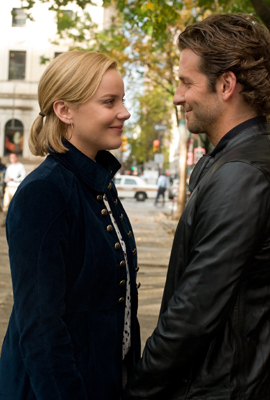 Working with Robert De Niro was the fulfillment of a longtime dream for Bradley Cooper. "Robert De Niro is one of the reasons I became an actor," he says. "When you work with someone that good, your job gets very easy. All you have to do is react to what they're doing."
Working with Robert De Niro was the fulfillment of a longtime dream for Bradley Cooper. "Robert De Niro is one of the reasons I became an actor," he says. "When you work with someone that good, your job gets very easy. All you have to do is react to what they're doing." With Robert De Niro and Bradley Cooper on board, the rest of the cast fell quickly into place, starting with Abbie Cornish as Lindy, Eddie's girlfriend."
Lindy, a magazine editor, has given Eddie her complete support. But even she has reached the end of her patience with him and ends their relationship as the film opens. When he discovers NZT and becomes wildly successful, they get back together again. "Abbie Cornish has a luminosity that makes it especially sad to think that Eddie could have blown it with her," says Leslie Dixon. "And indeed, one of the things the drug does is help him get her back."
Along with the opportunity to work with two actors whose work she admires, Abbie Cornish was drawn to the overall quality of the script. "It's extremely well-written," says the Australian-born actress. "This is a story you can lose yourself in because it feels like it could actually be happening. It's totally believable and very contemporary."
Lindy reconciles with Eddie after his amazing transformation, but she remains the voice of reason in the story. "Neil Burger always saw the role as being pivotal, even though it's a smaller one," says Abbie Cornish. "She's the only one who takes the drug and is able to understand the consequences. It changes what it is to be fallible, which is essential to being human."
Working with Neil Burger was an intensely collaborative experience for Abbie Cornish. "He's a very sensitive person who listens to the actors," she says. "It makes the process of filmmaking feel collective and that's very refreshing."
Abbie Cornish brought the right mixture of smarts and beauty to the role, says Neil Burger. "Abbie Cornish is fantastic," says Neil Burger. "She's so lovely and so talented. Abbie Cornish has this mischievous energy, but she's also incredibly bright. And the chemistry between Abbie Cornish and Bradley Cooper was immediate. They are pretty amazing together. You could feel the connection and get a sense of the history of their characters."
Abbie Cornish, almost all of whose scenes are all with Bradley Cooper, says his enthusiasm for the work was infectious. "Bradley Cooper took on the role wholeheartedly," she says. "It was awesome to watch. He has a great sense of humor as well as great depth to him, so he has that enormous range as an actor. He's perfect as Eddie, because he can go from the guy in a downhill spiral to someone who has completely got it together. He's also generous, and very engaging, which makes it a lot of fun to work with him."
When Eddie decides to play the stock market, he borrows money from the only source that will give it to him, a smalltime hood named Gennady, played by Andrew Howard. "Gennady grew up in Russia and moved to the United States twenty years ago," says Neil Burger. "He still has a thick Russian accent, and he's a very scary, dangerous cat. Borrowing money from him is reckless, but it's also very smart, because Eddie is able to turn a little money into a lot of money very quickly. The problem comes when Gennady gets wind of this drug and wants in on it."
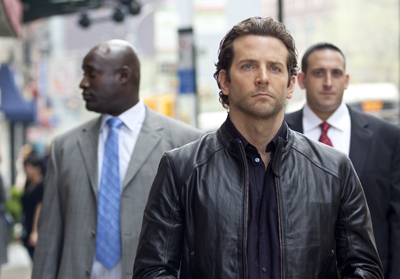 Creating the colorful thug was fun for Leslie Dixon, and when Andrew Howard was cast, he had some additional ideas that she incorporated into her script. "Gennady is a very primitive, crude thug," says the writer. "At first, Eddie is the only person that we see using NZT. When Gennady starts to take NZT, it smartens up a bad guy. Andrew Howard pointed out that when you give a thug this drug, he may not get as smart as Eddie, but an enhanced brain would give a bad guy enhanced capacity to be horrible."
Creating the colorful thug was fun for Leslie Dixon, and when Andrew Howard was cast, he had some additional ideas that she incorporated into her script. "Gennady is a very primitive, crude thug," says the writer. "At first, Eddie is the only person that we see using NZT. When Gennady starts to take NZT, it smartens up a bad guy. Andrew Howard pointed out that when you give a thug this drug, he may not get as smart as Eddie, but an enhanced brain would give a bad guy enhanced capacity to be horrible." The result is both humorous and terrifying. "Leslie Dixon and I talked about how it would be funny if every time you see him, his vocabulary is better, and he's a little more erudite," says Andrew Howard. "He develops a slightly different look. I wouldn't say he's looking good. It's more Eurotrashy nightclub. He's looking like the man about town, but it's just off-kilter."
Andrew Howard, who is from Wales, did research for the character by spending time in Brighton Beach's large Russian community. "That's where the character would be from," he says. "You see lots of Gennadys knocking about there, so it was quite an experience. I jumped on the chance to see and hear and feel a real Russian community right in New York City."
For Andrew Howard, the film's appeal comes down to the combination of extraordinary storytelling, acting and action. "The movie is a rip-roaring thriller," says the actor. "It's got edge. It's got brilliant performances. It's got Robert De Niro and Bradley Cooper. Neil Burger is an extraordinary director and he knew exactly how to tell this story. He always brought a little something extra to the table that would give it more nuance and color."
The Worlds of Eddie Morra
At his first meeting with the producers of Limitless, Neil Burger laid out his ambitious vision for the film. "The first element for me is the performance," he says. "How do we connect emotionally to the characters that guide us through the movie? Working with actors is one of the real pleasures of my job. As in my other movies, the goal is to get great and different performances out of the actors. In this case it was to shape Bradley Cooper's role through all the phases of his wild journey and support that performance visually.
"Eddie does some very suspect things over the course of the story but I wanted the audience to be completely with him and always on his side," the director continues. "Bradley Cooper has a winning personality-we love the guy-so that was half the battle. Then it was just a matter of subtle details in the performance and in the way we shot it to draw the audience in and make them feel complicit in his choices".
Neil Burger established different visual and performance languages for each phase of the story to give the audience the feeling of being inside Eddie's head. "It's one look when he's regular Eddie," explains the director. "It's another when he's coming on to the drug; a third when he's on it and another when he's off it. Each phase has a particular color palette, camera movement, design concept and acting style. I wanted the audience to always feel what he was feeling, to be zooming along with him.
"The visual effects were another component," Neil Burger continues. "How does he process information when he's on the drug? How does someone with extraordinary abilities sort through the noise and distractions of contemporary life and pull out the key and information? How do we show that so the audience gets some insight into the workings of his supercharged mind?"
Neil Burger devised a number of techniques and strategies to achieve his goal. "I used methods I hadn't seen before to give the film an almost hand-made feel rather than a digital one," he says. "And I wanted them to feel organic to his character, to have an emotional connection to him. I studied fractals, which is a self-replicating kind of design. I came up with a 360-degree vision to reflect his abilty to see everything from every perspective, and invented a visual method for showing how he remembers everything he's ever seen and heard. I wanted everything to have an intensity that reflects Eddie's experience, but also retain a certain whimsy. There's a dark humor throughout the film that is there in the visuals as well."
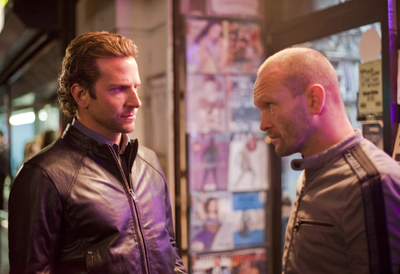 Working closely with his creative team, the director developed the different looks for the film, reflecting both the squalor of Eddie's pre-NZT days and the bright and shiny new life he finds through the drug. "When we first meet him, he's an ordinary guy who's failing," says Neil Burger. "He's living in New York, he's got no money and it's a pretty crummy life. I wanted to show even that in a new way, to make it beautiful in its own way, but with the edge and energy he's experiencing.
Working closely with his creative team, the director developed the different looks for the film, reflecting both the squalor of Eddie's pre-NZT days and the bright and shiny new life he finds through the drug. "When we first meet him, he's an ordinary guy who's failing," says Neil Burger. "He's living in New York, he's got no money and it's a pretty crummy life. I wanted to show even that in a new way, to make it beautiful in its own way, but with the edge and energy he's experiencing. "The design of the film, the camera movement, the composition, all needed to support the performance," he says. "They needed to express Eddie's state of mind. As you watch the movie, you can't really put your finger on it, but you feel it. When he's not on NZT, everything's gritty and harsh and unpleasant. When he's on that drug, everything flows effortlessly."
Neil Burger and director of photography Jo Willems built different visual vocabularies for Eddie's two states of mind. "We shot 'regular' Eddie with a hand-held camera and longer lens," says Jo Willems. "It's raw and it's messy, so it's not always pretty. The lighting is a little dirty. We didn't want to make him look too good."
With the drug, Eddie undergoes a complete transformation. "He feels like he's in total control, so the camera is much more controlled," says the Belgian cinematographer. "The visuals are much more polished. The lighting is softer. We used wider lenses, and it's all a bit more precise. It's as if we're inside his head. Because we were developing a character in a visual way, we weren't afraid to be very subjective with the imagery and pull the audience in."
Neil Burger and Jo Willems also developed some ingenious and surprisingly simple ways to communicate the effects of NZT. "Neil is so strong visually, he didn't need to use a lot of effects," says Scott Kroopf. "The ones he did use are done in a different style than people are used to.
They are very evocative and emotional, as opposed to technical. They're all about how the world is perceived in a different way when you're on this drug, so they have a very visceral quality."
For example, to demonstrate Eddie's rapid assimilation of all the information around him, Neil Burger and Jo Willems created the illusion of 360-degree vision. "The cameras were ganged together to show 360 degrees of his perception squeezed into our film frame," says Neil Burger. "I like the idea of it metaphorically. He can see everything, as if he has eyes in the back of his head. It creates a very surreal, intense image.
"I wasn't trying to come up with the newest visual effect," says Neil Burger. "I was trying to invent techniques that felt expressive of Eddie. Sometimes that meant a very simple in-camera effect, other times we did invent new looks. The point was to direct it, from performance to visuals, in such a way that you know what it feels like for him.
Production designer Patrizia van Brandenstein collaborated with Neil Burger to create the contrasting physical environments. "From the beginning, Neil Burger had a very strong vision," says Patrizia Von Brandenstein. "I think his work has shown him to be a very visually oriented filmmaker. The key word was always 'underscore.' We wanted to support the story, not overwhelm it.
"The film has enormous contrast and emotional moods," she adds. "Eddie's journey takes him from the bottom to the top. We question his reasons for making the journey and we question his reasons for wanting to stay there. But in the end, I think we have enormous sympathy for him. The moral choices our hero makes are very interesting in the modern world."
For Eddie's Chinatown tenement, Patrizia van Brandenstein uses a murky palette of tertiary colors that contrasted sharply with the primary reds and yellows of local street life. When his world changes, so do the colors surrounding him. "We see what an opportunist he is and how amoral his choices actually are. That's reflected by the coolness of modernist sensibility, with washed out blues, extremely pale greens and a great deal of gray. New York architecture is essentially the gray of slate, granite and steel, which is a very cool tone."
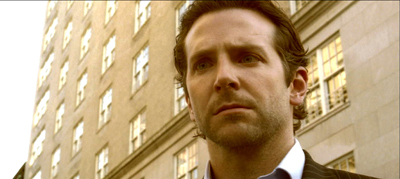 Limitless was shot on location in New York City and Philadelphia. Neil Burger, who lives in New York, put together a binder full of reference photos that represented his ideas on how to use his hometown as a backdrop. With only two weeks to shoot in the city, the shoot took on a rough and tumble atmosphere. "You can try to control everything in a movie and that can be great," the director points out. "But it can also kill the energy of the surrounding environment.
Limitless was shot on location in New York City and Philadelphia. Neil Burger, who lives in New York, put together a binder full of reference photos that represented his ideas on how to use his hometown as a backdrop. With only two weeks to shoot in the city, the shoot took on a rough and tumble atmosphere. "You can try to control everything in a movie and that can be great," the director points out. "But it can also kill the energy of the surrounding environment. We just let the street be what it is, with people passing by. Bradley Cooper would cross streets in the middle of the block, as you do when you're in New York. We had a very small crew following him, trying to keep it as real as possible."
Filming at as many as six locations a day, the crew tried to keep a low profile. "We would just send them off to shoot as much as they could," says Scott Kroopf. "And it really worked out. It has that feeling of stolen footage, as opposed to a choreographed Hollywood movie."
Without the time for elaborate setups, the filmmakers often simply used whatever light was available. "That gives the film a documentary feel," says Jo Willems. "I'm really into that style. When Eddie is on the drug, we had a more controlled way. We shot with cranes, dollies and steady cam. We had to work fast and it was good fun."
Neil Burger, who knows the city well, had very clear ideas about what he wanted. The crew filmed at some of New York's most iconic locations, capturing the unique pulse of Manhattan. "We shot on the East Broadway part of Chinatown," says Scott Kroopf. "It's nuts because there are always a million people on the street there. We shot on 52nd Street off 8th Avenue in a building called the Lynx. We shot in Chelsea, Tribeca and all over Midtown, which is about as busy and touristy a place as you can find. We shot a great action scene with Abbie Cornish at Wollman Rink in Central Park."
Abbie Cornish, who had visited New York many times, found the intensity of the experience inspiring. "I love New York," she says. "To actually film there was crazy. It's so busy and chaotic that you can't really have a proper set. We were working in the middle of the street with people passing by, but there was something incredibly energetic about that. As an actor, it ignited me in some ways. I had to really focus."
Shooting in New York presents unusual challenges, admits Leslie Dixon. "Forget crowd control. You can't do it. There are New Yorkers wandering through your shots. Fortunately, they're blasé enough not to look up. They've seen so much shooting they don't care."
But it was worth the extra effort, says the writer-producer. "There's only one New York City. This story could not have happened anywhere else. You cannot go from a crappy rent controlled tenement to a $12 million apartment at the biggest luxury high rise in the space of six weeks anywhere else. No city is more about those two extremes and the way people go from one to the other."
Boiling over with energy, emotion and nonstop motion, the finished film stays very true to the spirit of Neil Burger's New York. "The movie's about power," Neil Burger says. "New York is a real power center, with Manhattan as the big brain. I wanted to shoot as much as I could on the streets, without locking everything down. Too often, New York is turned into a Hollywood set, but we wanted it raw and real and flowing around us. It's a wild story that goes off on some crazy tangents and we tried to ground it in reality."
MORE
- Mission: Impossible Fallout
- Glenn Close The Wife
- Allison Chhorn Stanley's Mouth Interview
- Benicio Del Toro Sicario: Day of the Soldado
- Dame Judi Dench Tea With The Dames
- Sandra Bullock Ocean's 8
- Chris Pratt Jurassic World: Fallen Kingdom
- Claudia Sangiorgi Dalimore and Michelle Grace...
- Rachel McAdams Disobedience Interview
- Sebastián Lelio and Alessandro Nivola...
- Perri Cummings Trench Interview



